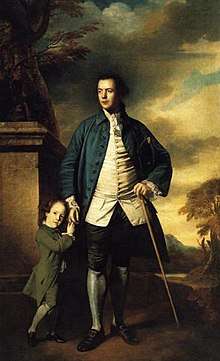Edward Morant (politician)
Edward Morant (1730–1791) was a British politician and plantation owner who sat in the House of Commons for 26 years from 1761 to 1787.

Early Life
Morant was the son of John Morant of Jamaica and his wife Mary Pennant, daughter of Edward Pennant, chief justice of Jamaica, and was baptised on 10 December 1730. He matriculated at St Mary Hall, Oxford on 7 March 1747.[1] Morant’s father died when he was three and when he came of age, he inherited many estates on the island of Jamaica, which had been in the family for a long time. The Morant’s estates were put at 8,159 acres, and the plantation accounts show an average income from Jamaica of about £20,000 per annum. Several places on the island take the family name including Morant River, Morant Point and Morant Bay.[2] Morant married firstly Eleanor Angelina Dawkins, widow of William Dawkins and daughter of Edward Yeamans of Liguanea, Jamaica, on 10 June 1754. She died two years later. Morant represented Vere in the Jamaica assembly between 1752 and 1756 and served in the council from 1757 to 1759. [3] He left Jamaica for England in 1759.[2]
Political career
In the 1761 general election Morant was returned on William Beckford’s interest as Member of Parliament for Hindon. He made a second marriage to Mary Whitehorne Goddard, daughter of James Goddard of Conduit St London on 22 April 1762. In the 1768 general election he stood for re-election at Hindon, but his own agents threw him over just before the poll and he came third. In February 1770 he purchased Brockenhurst House at Brockenhurst near Lymington for £6,400 and began to move in the foremost political and social circles.[2] He was awarded DCL in 1773.[1]
Morant next stood for parliament in 1774 when he was put up by his friend the Duke of Bolton for Lymington and was elected MP. As he was unlikely to be returned again for Lymington he quickly arranged to stand at Yarmouth in the 1780 general election and was returned as MP in that and the next election in 1784. He vacated his seat in 1787. He was described as a thoroughly independent Member: never held, nor solicited, any office or favour.[2]
Later Years
On 16 July 1791, Morant was driving in Kensington when his horses took fright. He was thrown from the carriage and carried home senseless.[3] He died on 27 July 1791. [2] His son Edward Morant was a cricketer.
References
- 1 2 Foster, Joseph. "Alumni oxonienses: the members of the University of Oxford, 1715-1886". University of Oxford.
- 1 2 3 4 5 "MORANT, Edward (1730-91), of Brockenhurst, nr. Lymington, Hants". History of Parliament Online. Retrieved 9 September 2017.
- 1 2 Frank Cundall. "Historic Jamaica". Institute of Jamaica 1915. Retrieved 11 September 2017.
| Parliament of Great Britain | ||
|---|---|---|
| Preceded by James Calthorpe William Mabbott |
Member of Parliament for Hindon 1761–1768 With: William Blackstone |
Succeeded by John St Leger Douglas William Hussey |
| Preceded by Hugo Meynell (Sir) Harry Burrard |
Member of Parliament for Lymington 1774–1780 With: (Sir) Harry Burrard 1774-1778 Henry Goodricke 1778-1780 |
Succeeded by Thomas Dummer Harry Burrard |
| Preceded by James Worsley Captain Robert Kingsmill |
Member of Parliament for Yarmouth 1780– 1787 With: Edward Rushworth1780-1781 Sir Thomas Rumbold1781-1784 Philip Francis1784-1787 |
Succeeded by Thomas Clarke Jervoise Philip Francis |